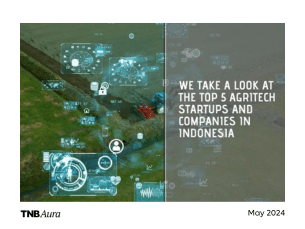
We take a look at the top 5 agritech startups and companies in Indonesia
Source: Tech CollectiveThe agritech landscape in Southeast Asia holds excellent promise as stakeholders combine agriculture and technology to address the region’s food insecurity challenges. According to the State of Food Security and Nutrition in the World 2022 report by the Food and Agriculture Organisation (FAO) and other partners, an estimated 6.3% of residents were at risk of going hungry or running out of food in 2021.
Indonesia is one of the countries in the Association of Southeast Asian Nations (ASEAN) trying to secure food sources for its 278 million citizens. Agritech startups can leverage technology to boost productivity, improve yields, track plant growth, and offer a platform for payments and produce trading.
President Joko Widodo launched the Food Estate Programme, managed by the Ministry of Defence, to ensure the country’s food security by growing crops like rice on vast agricultural land. The program’s planned budget is over IDR 114 trillion.
Here’s a closer look at some forerunners in Indonesia’s agritech startup ecosystem:
AgriAku
Tech-based company AgriAku acts as a distribution service for farmers and other stakeholders through its app. It was founded in 2021 by Danny Handoko and Irvan Kolonas. It offers a marketplace for people to buy and sell fertilisers, seeds, chemicals, business software, and more. It uses sustainable, inclusive, and profitable models to help its partners.
Thus far, AgriAku has raised USD 46 million in four funding rounds from 16 investors. These include Argor Capital, Gentree Fund, Indogen Capital, TNB Aura, Innoven Capital, MDI Ventures, and Alpha JWC Ventures. It plans to use the money it has made to increase its team, provide better products, enable customers and merchants to transact seamlessly, and enhance its market penetration.
Towards food security with agritech in Indonesia
Agritech startups in Southeast Asia have many advantages that can help Indonesians grow their foods effectively, at lower costs, and sustainably. Yet, the country faces challenges such as supply chain fragility, inadequate funding, and underdeveloped infrastructure in rural areas.
There is also the issue of sustainability in the agritech landscape due to harmful fertilisers damaging the soil and seeping into water basins, making them unsafe for humans.
Nevertheless, the hope is that every agritech startup in Indonesia can make a difference by innovating novel solutions to guarantee the country can grow healthy crops using sustainable fuel sources like solar power. Furthermore, they can continue improving technology, such as the Internet of Things (IoT) and artificial intelligence (AI), as they move towards processing data collected by machine sensors.
Edited for brevity